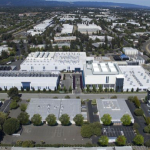Data Center Stocks Could Be Winners as Internet Use Surges

Real Estate - Sector Focus
There aren’t many bright spots in tech these days, but some data-center stocks are holding up and could continue to be winners.
“Data centers are lighthouses in the storm,” wrote Berenberg Capital Markets analyst Nate Crossett in a recent note. Data centers were down an average 7% as of March 26, compared with a 32% decline for real-estate investment trusts, or REITs, as a broader group. The sector has recovered a bit since then, and a few data centers are now in positive territory.
Industry leader Equinix (EQIX) is up 7% for the year. Digital Realty Trust (DLR) has gained 16% (following its merger with InterXion) and QTS Realty Trust (QTS) is ahead 6.9%. Those returns all beat the 19% decline in the S&P 500 Information Technology sector.
Data centers are a hybrid between tech stocks and REITs, which pay out the vast majority of their earnings as dividends as a condition for favorable tax treatment. The companies are property developers that own vast, climate-controlled buildings that house corporate data servers and networking gear.
They lease space to large enterprises such as Microsoft (MSFT), Salesforce.com (CRM), and Facebook (FB). As a result, they benefit from growth in the digital economy: trends such as cloud computing, social media, artificial intelligence, e-commerce, and online video.
It makes sense that data centers would fare well under today’s circumstances. Unlike owners of malls, lodging, and senior-living centers—all hard-hit subsectors of the REIT world—data centers aren’t directly affected by the coronavirus. Quite the contrary: Internet usage is rising as more people work from home, consume online content, and socialize in a digital world (rather than going to movies or restaurants).
Data centers don’t benefit directly from these trends, but their tenants do. That will help to insulate data centers and their revenue streams from the coming economic slowdown.
Data centers won’t be immune. Development plans for new and upgraded facilities may be delayed due to cutbacks in capital expenditures and liquidity concerns. Prospective tenants may have trouble procuring hardware due to supply-chain disruptions, and real- estate values are under pressure. Data centers are also battling a long-term headwind as companies like Facebook, Amazon.com (AMZN), and Microsoft build their own data centers and cut back on leasing.
Nonetheless, this is an area of tech and real estate that should continue to grow. While expansion plans may be delayed, rents should continue to roll in—partly because large tenants rarely relocate once they have established hardware in a data center. And location matters; the more connectivity in a data center and the closer it is to a population hub, the higher the property value and advantages of interconnection for tenants.
Three names to consider, according to Crossett, are Equinix, Switch (SWCH), and QTS Realty.
Equinix should generate 7% growth in adjusted funds from operations, or AFFO, in 2020, one of the healthier growth rates in the industry, he writes. Just 2% of Equinix’s debt comes due this year and only 7% matures in the next three years. Equinix has a leading position in the industry, operating 200 data centers globally and providing “co-location” to more than 1,500 tenants. None of that is changing.
Equinix stock has never been cheap due to its competitive advantages and it isn’t inexpensive now, trading at 26 times AFFO, above the industry average of 20 times. But the stock tends to outperform during periods of market turbulence, Crossett writes. It is living up to that reputation, outperforming the broader REIT sector this year.
He has a $653 price target on the stock. Shares recently traded around $625.
Switch is a more speculative data center. It’s a smaller company, with a market capitalization of $3.5 billion. The company went public in 2017 and its stock trades below the initial offering price, due partly to concerns that its aggressive growth plans may come at the price of shareholder returns.
Switch operates three data-center campuses, including two in Nevada, and is developing a fourth in Atlanta. It is focusing on building vast “digital cities” with data centers of more than 1 million square feet—offering a mix of storage, co-location, connectivity, and “edge” computing power.
The company also has a cheap source of energy with two of its data centers located in the Nevada desert. It is committed to 100% renewable power, potentially making the stock appealing to socially conscious investors.
Crossett views the stock favorably. AFFO is on track to grow by 26% in 2020, he writes, one of the highest growth rates in the industry. Despite its build-out plans, Switch has one of the healthier debt profiles with net debt of 3.4 times earnings before interest, taxes, depreciation, and amortization. The firm converted some of its shares to a more shareholder-friendly class late last year (removing a corporate- governance overhang), and it may now be more attractive as an acquisition target.
Crossett has a $16.50 price target on the stock, up from recent prices around $14.40.
QTS also has strong growth prospects, with AFFO expected to rise 8% this year and 10.1% in 2021. The firm has hardly any debt coming due this year or next, Crossett writes, and it had a record backlog of requests for space at the end of 2019, implying that growth could increase further this year.
Crossett had a price target of $70 on the stock in late February. That has come down to $59 now, slightly above where the stock recently traded at $58. Nonetheless, the stock could still make gains.
“Given the leasing momentum, we believe guidance could prove to be conservative,” he wrote in a recent note. QTS is also one of the higher- yielding data-center stocks with a 3.2% yield.
By Daren Fonda, Barrons April 1, 2020



